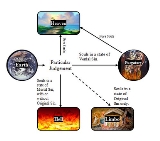
Particular judgment
Overview
Christian
A Christian is a person who adheres to Christianity, an Abrahamic, monotheistic religion based on the life and teachings of Jesus of Nazareth as recorded in the Canonical gospels and the letters of the New Testament...
eschatology
Eschatology
Eschatology is a part of theology, philosophy, and futurology concerned with what are believed to be the final events in history, or the ultimate destiny of humanity, commonly referred to as the end of the world or the World to Come...
, is the judgment given by God
God
God is the English name given to a singular being in theistic and deistic religions who is either the sole deity in monotheism, or a single deity in polytheism....
that a departed person undergoes immediately after death, in contradistinction to the General judgment
General judgment
General judgment is the Christian theological concept of a judgment of the dead by nation and as a whole. It is related closely to Judgment day and often is just another phrase for the Last judgment, but is not necessarily part of any eschatology...
(or Last judgment
Last Judgment
The Last Judgment, Final Judgment, Day of Judgment, Judgment Day, or The Day of the Lord in Christian theology, is the final and eternal judgment by God of every nation. The concept is found in all the Canonical gospels, particularly the Gospel of Matthew. It will purportedly take place after the...
) of all people at the end of the world.
Ecclesiastes
Ecclesiastes
The Book of Ecclesiastes, called , is a book of the Hebrew Bible. The English name derives from the Greek translation of the Hebrew title.The main speaker in the book, identified by the name or title Qoheleth , introduces himself as "son of David, king in Jerusalem." The work consists of personal...
11:9; 12:1 sq., are quoted in proof of the particular judgment.
The first-century Jewish writing known as the Testament of Abraham
Testament of Abraham
The Testament of Abraham a pseudepigraphic text of the Old Testament. Probably composed in the 1st or 2nd century CE, it is of Jewish origin and is usually considered to be part of the apocalyptic literature. It is not regarded as scripture by Jews or any Christian group...
includes a clear account of particular judgment, in which souls go either through the wide gate of destruction or the narrow gate of salvation.

